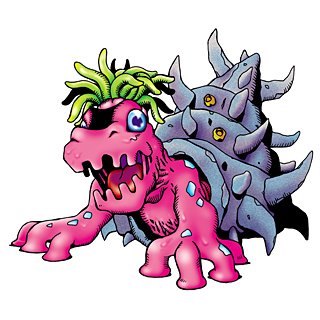
If you are familiar at all with Japanese monsters, you have no doubt seen odd, spiky snail shells adorning a pink, hermitcrab-like monster. You may have also seen the monster "Cornutus" in the Korean MMORPG Ragnarok Online. Ever wonder where they came from? Well, wonder no more:

That snail is one of the many snails of the family Turbinidae, or "turban snails." The common name comes from their shells' resemblance to a turban; the scientific name has the same roots as the word 'turbine' - a reference to a top used by ancient Roman children. There is another family called "top snails" that is similar to turban snails in several aspects.
Unlike most snail shells, the shells of turban snails spiral upwards. They are sometimes ringed with long spikes for protection. Turbo cornutus in particular has spikes curling all along the spiral of its shell.

Although the shell is the most visible feature to us humans, what really sets turban snails apart are their calcified opercula. The operculum is the 'door' that snails use to hide entirely inside their shells; in turban snails, it is a lot harder to break open. These have been used throughout history as incense and jewelery. Hell, some opercula from larger turban snail specimens have been used as paperweights.

This is Turbo marmoratus, one of the largest turban snails. It is native to the waters around Madagascar. Its shell is also a source of mother-of-pearl.
Japan in particular has a rather interesting take on the turban snail. The turban snail is one of many animals that, after living for a certain amount of time, becomes a supernatural entity (a youkai). The result of a turban snail living for 30 or more years is called a "sazae-oni"- literally, "shellfish demon."

One of the most famous stories involving this youkai tells of an encounter with a group of pirates. After rescuing a beautiful woman from the sea, the pirates debated over who should have his way with her. She made it easy; she was all too willing to have sex with all of them. The next morning, the scallywags found that she had cut their nuts off, and tossed her back into the ocean. There she took the form of a giant turban snail; the pirates bargained with the snail for their balls back. The turban snail left with a hoard of pirate gold. (Testicles are sometimes called "golden balls" in Japanese (much like "jewels" elsewhere), so the pun is that gold was bought with gold.) Sounds like a good business formula to me.

Slowbro agrees.

No comments:
Post a Comment